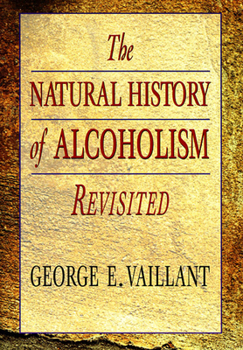The Natural History of Alcoholism Revisited
Select Format
Select Condition 
Book Overview
When The Natural History of Alcoholism was first published in 1983, it was acclaimed in the press as the single most important contribution to the literature on alcoholism since the first edition of Alcoholic Anonymous's Big Book. George Vaillant took on the crucial questions of whether alcoholism is a symptom or a disease, whether it is progressive, whether alcoholics differ from others before the onset of their alcoholism, and whether...
Format:Paperback
Language:English
ISBN:0674603788
ISBN13:9780674603783
Release Date:May 1995
Publisher:Harvard University Press
Length:462 Pages
Weight:1.35 lbs.
Dimensions:1.1" x 6.3" x 9.6"
Related Subjects
Addiction & Recovery Alcoholism Clinical Education & Reference General Health, Fitness & Dieting Health, Fitness & Dieting Internal Medicine Medical Medical Books Medicine Neurology Psychology Psychology & Counseling Psychopathology Reference Self Help Self-Help Self-Help & Psychology Substance Abuse TextbooksCustomer Reviews
3 ratings
Absolutely amazing!!
Published by Thriftbooks.com User , 15 years ago
One of the most provocative books on alcoholism I have ever read. A prospective, rather than retrospective examination of alcoholism in men. A scientific look at risk factors for recovery and relapse. A definitive piece, updated from the original.
A vital book on the long-term course of alcoholism
Published by Thriftbooks.com User , 23 years ago
This book is written with a scholarly audience in mind and may be a challenging read for anyone who is not a professional in the field of mental health or medicine.The author of The Natural History of Alcoholism, George E. Vaillant, is a Professor of Psychiatry at Harvard Medical School. He is also Director of the Study of Adult Development at Harvard University Health Services and Director of Research in the Division of Psychiatry of Brigham Hospital and Women's Hospital in the Boston, Massachusetts area. The insights on alcoholism in this book come from a long-term study conducted by the Harvard Medical School's Study of Adult Development (SAD). The following groups have funded SAD: the National Institute of Mental Health, the National Institute of Alcohol Abuse and Alcoholism, the National Institute of Aging, the William T. Grant Foundation, the Spencer Foundation, the Milton Fund and the Commonwealth Fund. SAD has followed 655 men from 1940 to the present, over 60 years. Other than this study, five to eight years is the most any other scientists have followed alcoholics. At the start of SAD, the subjects were young men, and none of them had yet manifested any symptoms of alcoholism. By following their lives over many decades, the researchers learned a great deal about how alcoholism, a chronic condition, manifests and changes over time. In 1940, the participants of SAD were divided into two groups: (1) College Sample: 268 upper-class, male, Harvard sophomores were selected with 27 eventually excluded due to death, withdrawal from the study or lack of adequate information on them. Of the 241 that were left, at age 70, the lifetime prevalence of alcohol abuse was 22%. That is, during their adult life, 52 of them met the DSM-III criteria for alcohol abuse. (2) Core-City Sample: 456 lower-class boys from Boston's inner city were junior-high-school age at the start of the study. Of these, 414 were able to be adequately studied over time. By age 60, at some point in their adult lives 36%, or 150, of them met the DSM-III criteria for alcohol abuse. Dr. Vaillant states that the lifetime prevalence of alcohol abuse is 24% among white, middle-aged males, according to another study released 10 years ago of 20,000 adults. This figure falls between the 22% for the College sample and the 36% for the Core City sample.Dr. Vaillant thoroughly discusses the findings of SAD on the following research questions: (1) Is alcoholism a symptom or a disease? (2) Does alcoholism usually get progressively worse? (3) Are alcoholics, before they begin to abuse alcohol, different from nonalcoholics? (4) Is abstinence a necessary goal of treatment, or can insisting on abstinence sometimes be counterproductive? (5) Is returning to safe, social drinking possible for some alcoholics? (6) Does treatment alter the natural history of alcoholism? (7) How helpful is Alcoholics Anonymous in the treatment of alcoholism?Here are a few fascinating points on these issues that Dr. Vailla
There is no equal to this book
Published by Thriftbooks.com User , 25 years ago
This book is one-of-a-kind. There has never been a more carefully done longitudinal study of alcoholism over a longer period of time (we're talking following young men, many of whom became alcoholics, for 50 years, here). This book is a national treasure to those interested in what happens to the unfortunate folks who develop alcoholism. I only wish we had more than 5 stars.





